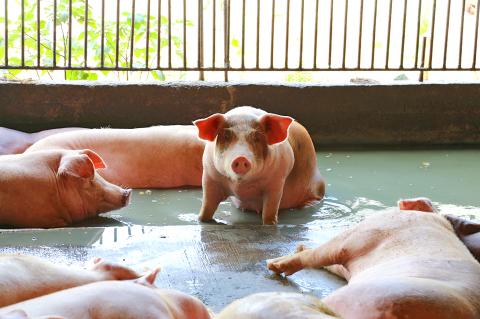Hog farms not regulated by environmental authorities must stop using leftovers as pig feed within a week, the Council of Agriculture (COA) said yesterday, adding that samples of another three pork products from China have tested positive for African swine fever after being seized by customs officials.
The council on Saturday said that it would not immediately ban the use of leftovers at all hog farms, but at yesterday’s third meeting of the Central Emergency Operation Center — which oversees measures to control the disease — said that it would restrict such operations.
Only farms on an Environmental Protection Administration (EPA) regulatory list would be allowed to continue feeding pigs leftovers, COA Acting Minister Chen Chi-chung (陳吉仲) said, adding that 357 farms were on the list.

Photo: CNA
The 1,155 hog farms that use leftovers but are not on the list must switch to commercial fodder, cease operations within a week or get EPA approval to use leftovers, COA Deputy Minister Huang Chin-cheng (黃金城) said.
Farms have to pass reviews of disinfection procedures for leftovers, as well as air and water pollution control facilities, before they can be placed on the list, EPA Bureau of Environmental Inspection Deputy Inspector-General Lin Jso-hsiang (林左祥) said, but adding that it is more difficult for smaller farms to pass the reviews.
The nation has about 7,230 hog farms and those using leftovers are mostly small-scale farms, Department of Animal Industry Deputy Director Wang Chung-shu (王忠恕) said.

Photo: Chiu Chih-jou, Taipei Times
Some farmers have planned a demonstration on Wednesday to protest the council’s disinclination to ban leftovers as pig feed, but the protest would be unnecessary, as the new rules would minimize the risk of transmission via leftovers, Huang said.
However, the council would continue to negotiate with the farmers, he said.
Meanwhile, three pork products from China seized at customs have tested positive for the African swine fever virus, bringing the number of such products to 10 since China reported its first infection in early August last year, he said.
The council on Dec. 18 increased fines for those found illegally importing pork products from areas affected by the disease to NT$200,000 (US$6,480) for first-time offenders and NT$1 million for repeat offenders, but customs officials had still intercepted 44 such products among 131 illegal meat imports as of Saturday, council data showed.
First-offense fines for non-pork meat products start from NT$10,000 if they are from areas without animal diseases and NT$30,000 if they are from areas with foot-and-mouth disease or bird flu.
Visitors of other nationalities, such as Vietnamese, have stopped trying to illegally import meat since the council increased the fines and boosted promotion of its policies, but Chinese visitors continue to do so, Huang said, adding that the trend is no longer attributable to insufficient information.
As cross-strait travel is expected to increase before and during the Lunar New Year holiday next month, the council would dispatch 20 more quarantine officials to ports in Kinmen County, as well as Taiwan Taoyuan International Airport and Kaohsiung International Airport, he said.
Meanwhile, a pig carcass found on Kinmen County’s Siaociou Islet (小坵島) on Friday yesterday tested negative for the disease, although another one found in the county on Monday last week tested positive, the council said.
Reports of dead animals on Taiwan proper have been increasing, but none have been confirmed to carry the virus, with some carcasses being dogs, it said.

US President Donald Trump yesterday announced sweeping "reciprocal tariffs" on US trading partners, including a 32 percent tax on goods from Taiwan that is set to take effect on Wednesday. At a Rose Garden event, Trump declared a 10 percent baseline tax on imports from all countries, with the White House saying it would take effect on Saturday. Countries with larger trade surpluses with the US would face higher duties beginning on Wednesday, including Taiwan (32 percent), China (34 percent), Japan (24 percent), South Korea (25 percent), Vietnam (46 percent) and Thailand (36 percent). Canada and Mexico, the two largest US trading

AIR SUPPORT: The Ministry of National Defense thanked the US for the delivery, adding that it was an indicator of the White House’s commitment to the Taiwan Relations Act Deputy Minister of National Defense Po Horng-huei (柏鴻輝) and Representative to the US Alexander Yui on Friday attended a delivery ceremony for the first of Taiwan’s long-awaited 66 F-16C/D Block 70 jets at a Lockheed Martin Corp factory in Greenville, South Carolina. “We are so proud to be the global home of the F-16 and to support Taiwan’s air defense capabilities,” US Representative William Timmons wrote on X, alongside a photograph of Taiwanese and US officials at the event. The F-16C/D Block 70 jets Taiwan ordered have the same capabilities as aircraft that had been upgraded to F-16Vs. The batch of Lockheed Martin

GRIDLOCK: The National Fire Agency’s Special Search and Rescue team is on standby to travel to the countries to help out with the rescue effort A powerful earthquake rocked Myanmar and neighboring Thailand yesterday, killing at least three people in Bangkok and burying dozens when a high-rise building under construction collapsed. Footage shared on social media from Myanmar’s second-largest city showed widespread destruction, raising fears that many were trapped under the rubble or killed. The magnitude 7.7 earthquake, with an epicenter near Mandalay in Myanmar, struck at midday and was followed by a strong magnitude 6.4 aftershock. The extent of death, injury and destruction — especially in Myanmar, which is embroiled in a civil war and where information is tightly controlled at the best of times —

China's military today said it began joint army, navy and rocket force exercises around Taiwan to "serve as a stern warning and powerful deterrent against Taiwanese independence," calling President William Lai (賴清德) a "parasite." The exercises come after Lai called Beijing a "foreign hostile force" last month. More than 10 Chinese military ships approached close to Taiwan's 24 nautical mile (44.4km) contiguous zone this morning and Taiwan sent its own warships to respond, two senior Taiwanese officials said. Taiwan has not yet detected any live fire by the Chinese military so far, one of the officials said. The drills took place after US Secretary